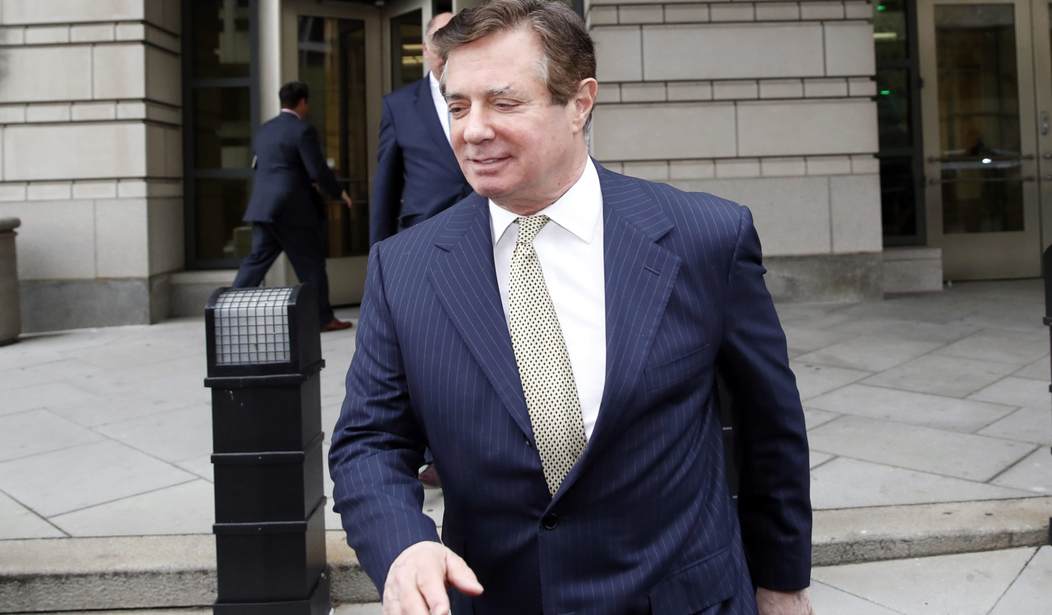WASHINGTON — Special counsel Robert Mueller opposed former Trump campaign chairman Paul Manafort’s motion to delay his trial in the Eastern District of Virginia until after his Washington, D.C., trial, arguing in a new filing that Manafort doesn’t need more time to review documents that came from his own office.
Manafort was originally supposed to go to trial in Virginia on July 10. That was delayed until July 25 to allow the defense additional time to prepare. Now, Manafort’s team wants the trial delayed by months and moved from the Beltway to Roanoke, Va., arguing there are too many Hillary Clinton voters in Alexandria, Va., to put together an impartial jury.
U.S. District Judge T.S. Ellis III, who ordered that Mueller be moved from a prison about 100 miles away from D.C. to Alexandria to have closer contact with his legal team, gave Mueller’s team until Friday to respond.
Mueller’s reply filed in court today noted that “the defense has not brought a single issue to the government’s attention, until it received this motion seeking to use his alleged prison conditions as a basis for an adjournment.”
Manafort was sent to jail June 15 as a judge agreed there was no way to restrain the lobbyist from alleged witness tampering if he remained on the outside.
A federal grand jury in the District of Columbia returned the third superseding indictment against Manafort and Konstantin Kilimnik of Moscow, adding obstruction of justice charges alleging they “knowingly and intentionally attempted to corruptly persuade” two people associated with Manafort’s lobbying operation “with intent to influence, delay, and prevent the testimony of any person in an official proceeding.”
Manafort’s attorneys argued that his “innocuous” contacts with witnesses was twisted into a “sinister plot” of witness tampering by prosecutors.
Mueller argued today that the revocation of Manafort’s bail has not been “unduly interfering with his ability to prepare for trial,” especially as his living circumstances are “in various ways less restrictive” than for other inmates.
“In fact, Manafort has reported, in a taped prison call, that he has reviewed all discovery: Just days before filing his motion for a continuance, Manafort told the person on the call that, ‘I’ve gone through all the discovery now.’ And he has had extensive access to his counsel and materials: On July 4, 2018, Manafort remarked in a taped prison call that he is able to visit with his lawyers every day, and that he has ‘all my files like I would at home,'” continues the court filing.
Mueller added that “contrary to Manafort’s assertions about his jail conditions,” Manafort is not confined to a cell, has a private unit with access to a workroom each morning, and has had regular visits from his attorneys. He has his own phone and bathroom, and doesn’t have to wear a prison jumpsuit. Manafort was heard on a monitored prison phone call saying he was being treated “like a VIP,” the filing adds; calls not with his attorneys are subject to monitoring.
“According to prison telephone logs, in the last three weeks Manafort has had over 100 phone calls with his attorneys, and another 200 calls with other persons,” Mueller added. “…Manafort also possesses a personal laptop that he is permitted to use in his unit to review materials and prepare for trial. The jail has made extra accommodations for Manafort’s use of the laptop, including providing him an extension cord to ensure the laptop can be used in his unit and not just in the separate workroom.”
Out of 32,544 produced since Manafort went behind bars, 20,207 are from a bookkeeping service that worked for Manafort — thus, Mueller argued, Manafort “had access to this material long before the government did.”
“Indeed, over a year ago, the government was negotiating with Manafort’s defense counsel to obtain the non-privileged NKSFB documents, so Manafort cannot now plausibly claim he needs more time to review these documents because they were only recently made available to him. As for the documents on the Gates MacBook, there are 8,290 documents; review of that material can be accomplished well in advance of the July 25 trial date and does not warrant a months-long adjournment,” he added.
In a recorded prison call, Manafort discussed trying to get his D.C. trial to go first and tells the other party to “think about how it’ll play elsewhere….There is a strategy to it, even in failure, but there’s a hope in it.” Manafort further argued a delay in Virginia was needed to allow “passions to cool.”
“He cites no evidence that there are jury pool passions about Manafort that need to cool or that could not be weeded out in the course of thorough jury selection,” Mueller stated. “And even if he had produced evidence of such passions, he has cited no evidence that such passions would cool in the ensuing two months, around election season. Nor does he explain why the same alleged passions do not exist in the D.C. Case—a venue that presumably Manafort views as akin to the Alexandria venue he seeks to avoid for the reasons articulated in his change of venue motion, i.e., who a proposed juror voted for and exposure to ‘inside the beltway’ media.”
Manafort is charged with conspiracy against the United States, conspiracy to launder money, being an unregistered agent of a foreign principal, making false and misleading FARA statements, and false statements, in addition to the obstruction charge. His D.C. trial is scheduled for September.
Manafort was on Trump’s campaign team from March to August 2016, starting as a delegate-wrangler and serving as campaign manager in the last three months. Former Trump campaign aide Rick Gates came on board with Manafort and stayed for the duration of the campaign, later serving as deputy chairman for Trump’s inaugural committee and then starting a pro-Trump PAC.
Gates struck a plea deal in February on a raft of charges similar to what Manafort is facing.








Join the conversation as a VIP Member